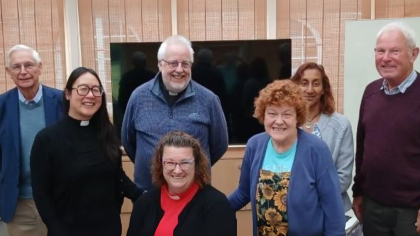The Bishop of Winchester, the Rt Revd Dr Tim Dakin, lead bishop for Further and Higher Education, has welcomed the recent publication of a White Paper which aims to revolutionise post-16 education.
The Government’s Skills for Jobs White Paper: Lifelong Learning for Opportunity and Growth aims to revolutionise post-16 education, reshape the training landscape and help the nation build back better.
The Bishop of Winchester, described the paper as “a positive recognition of the role and value of Further Education,” stressing the important role Further Education has in supporting the growth and wellbeing of the nation.
The Paper sets out plans for delivering a new national focus on jobs and skills, to increase productivity, support industry growth, and create opportunities for individual career progression by:
- Putting employers at the heart of the system so that education and training lead to jobs that can fill skills gaps in line with the Industrial Strategy.
- Investing in higher-level technical qualifications that provide a valuable alternative to a university degree.
- Providing well-informed careers support and access to flexible training and learning throughout life.
- Reforming, funding and accountability for providers to simplify how funds are allocated, give providers more autonomy and ensure effective accountability which delivers value for money.
- Supporting excellent teaching in Further Education.
Bishop Tim said:
“I’m delighted by the positive recognition of the role and value of Further Education in this White Paper. The Paper proposes that employers and industries are integral to FE in training for the skills that are needed, in improving access to lifelong learning, and increasing personal development and educational opportunities for all adults and young people, regardless of background.
The pandemic has revealed the strategic significance of the services sector, including the core services of education and healthcare. Our vulnerability has also made us aware of how important new technology is for social communication and for helping us tackle our social responsibility for climate change. FE training and skills education are vitally important in preparing people to work in the services sector and for developing the technical STEM skills needed in an entrepreneurial economy and in the challenges of greening our manufacturing, transport and energy industries.
FE Colleges are not just anchor institutions for their regions, providing skills tailored to the needs of local employers, they are also central to the wellbeing of regional communities. Colleges are places where real transformation of the individual and of our wider society can take place. They are places where levelling-up in our society is fostered, and where building-back into our society is enabled.
We need a purposeful vision for society which values the contribution that each individual can make to sustaining the mutual flourishing of all people so as to support the common good. The Paper is a significant step towards a radical long term plan for FE and serious investment in the sector.”





